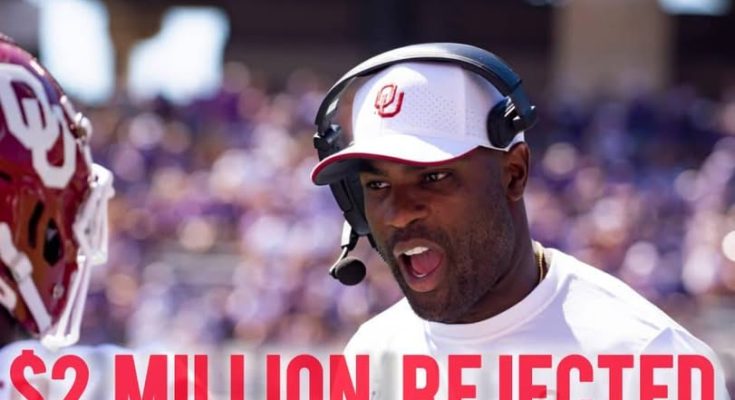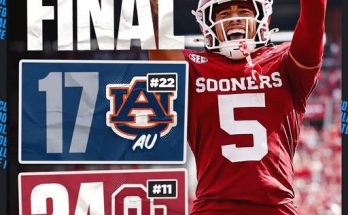A former standout for the Sooners himself and one of the most electrifying running backs in program history, Murray’s tenure as OU’s running back coach has been marked not just by impressive recruiting wins and on-field results, but also by his mentorship and leadership off the field. When Michigan came calling—reportedly making him one of the highest-paid position coaches in the nation if he accepted—many assumed that even a deeply loyal alum like Murray might find the offer too good to pass up. After all, Michigan is fresh off a College Football Playoff National Championship, recruiting at a high level, and part of the new-look Big Ten that is pulling in money and talent from coast to coast. But Murray’s response made clear that his sense of purpose at Oklahoma transcends mere compensation or external prestige.
His brief but impactful statement—“The Sooners isn’t just a job—it’s a mission”—echoes sentiments that fans and alumni have long cherished. It’s not just a slogan. It’s a rallying cry for those who view Oklahoma football not as a stepping-stone, but as a destination, a calling. Murray’s reference to “the rivalry” is particularly poignant. The Red River Rivalry between Oklahoma and Texas, the growing tensions with the SEC, and historical clashes with programs like Nebraska and Oklahoma State have defined the cultural fabric of OU football. For Murray, these aren’t just games—they are traditions to be preserved, battles to be honored, and legacies to be continued.
The fact that a young, ambitious coach turned down a life-changing offer speaks volumes not just about his character, but about the strength and direction of the Oklahoma program under Brent Venables. Venables himself has instilled a culture that values development, accountability, and long-term commitment. Murray’s loyalty reinforces that blueprint. In an era where coaching turnover is rampant and opportunism often trumps tradition, Murray’s decision represents a stabilizing force for the Sooners. For recruits and their families, the consistency in leadership is a major draw. For current players, it confirms that the relationships they’ve built with their position coach won’t be abruptly interrupted.
From a recruiting standpoint, the ripple effect could be significant. Murray has already played a critical role in helping Oklahoma land top-tier running back talent in recent classes, and his continued presence provides momentum heading into the SEC era. Stability on a coaching staff is often a deciding factor for elite high school players. The notion that they can trust the man who sat in their living room and promised to develop them—rather than seeing him bolt for the next big paycheck—has deep resonance. Parents want to know their sons will be mentored by men of principle, and Murray’s decision only strengthens that narrative.
Moreover, the symbolic impact within the broader college football landscape cannot be ignored. Michigan’s aggressive push to lure Murray signals a shift in strategy for the Wolverines following Jim Harbaugh’s departure to the NFL. The new regime clearly saw Murray as a key piece to modernizing their offense and maintaining momentum post-championship. That they would extend such a lucrative offer to a position coach shows just how high his stock has risen nationally. And yet, in spite of the enormous professional validation that came with that offer, Murray effectively told the college football world: “I already have what I want. I’m already where I belong.”
Oklahoma fans have responded with an outpouring of support, flooding social media with messages of appreciation and pride. Former players, media members, and even rival coaches have taken notice. Loyalty, while often celebrated, is rarely tested at this magnitude. That Murray passed the test without hesitation has made him a hero in Norman—not just for what he’s done on the field, but for what he represents off it.
Behind the scenes, it’s likely that Oklahoma made some counter-moves to ensure that Murray felt valued and appreciated. While the exact details of any contractual adjustments have not been made public, sources within the program suggest that there were internal conversations about incentives and long-term planning. Still, no matter how the financial elements shake out, the essence of the decision remains unchanged: DeMarco Murray turned down more to stay with less—because what Oklahoma offers can’t always be measured in dollars.
His players are equally thrilled. Several current Sooners running backs, including projected starter Gavin Sawchuk and rising star Taylor Tatum, have expressed their joy in knowing that their coach isn’t going anywhere. For them, continuity means trust, and trust translates into confidence. It means training in the same system, under the same expectations, with a mentor who genuinely cares about their futures on and off the field. That’s not something money can replace.
It also says something about the culture Murray himself is helping to build. Oklahoma has long prided itself on being more than a football factory. From Barry Switzer to Bob Stoops to Lincoln Riley and now Brent Venables, each era has had its signature style, but the heart of the program has always been about community and character. Murray embodies both. He could’ve taken the glitz of Ann Arbor, the blue blood prestige of Big Ten dominance, and the fat paycheck that came with it. But he stayed grounded in the relationships, rivalries, and roots that shaped him.
His decision will likely be remembered as a defining moment in his coaching career. Coaches often bounce from program to program in search of the perfect fit or the highest bidder. But those who anchor themselves to a cause larger than themselves tend to leave a legacy far more enduring. Murray already had the legacy as a player. Now, he’s building one as a coach—not just through wins and development, but through a loyalty that few can match.
What makes this even more impressive is that Murray is still relatively early in his coaching trajectory. He only began his full-time coaching career at Arizona before returning to OU in 2020. Since then, his rise has been meteoric. His ability to connect with recruits, his attention to detail, and his vision for developing complete athletes—both physically and mentally—have all contributed to his growing reputation. That Michigan, a program with deep pockets and fresh national hardware, identified him as a prime target tells you everything about where Murray is headed. And yet, by choosing not to leap at the opportunity, he’s signaled that his ambitions are not tied solely to title chases or financial milestones—they’re tied to building something special at Oklahoma.
His long-term future might still include a head coaching role down the road—perhaps even at Oklahoma, if the timing and opportunity align. For now, though, the message is loud and clear: DeMarco Murray is not finished in Norman. He’s not looking elsewhere. He’s not chasing a paycheck. He’s digging deeper into the crimson soil that made him who he is, planting roots that many hope will grow into the kind of legacy that lasts generations.
As Oklahoma prepares to enter the SEC officially, having staff members like Murray in place is not just beneficial—it’s essential. The battles will only get tougher, the competition more fierce, the spotlight even brighter. But with leaders like Murray holding the line, the Sooners are equipped with more than talent. They have conviction. They have purpose. They have loyalty.
It’s a message to recruits, to fans, and even to rival programs: Oklahoma is not just surviving the chaotic churn of modern college football. They are thriving in it—precisely because men like DeMarco Murray are choosing to stay, choosing to build, and choosing to believe that some things—like honor, loyalty, and the power of home—are still worth more than a multimillion-dollar check.



